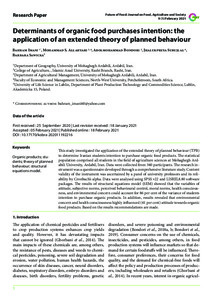Datum
2021-02-18Autor
Imani, BahramAllahyari, Mohammad SadeghBondori, AbolmohammadSurujlal, JhalukpreyaSawicka, BarbaraSchlagwort
150 Psychologie 630 Landwirtschaft, Veterinärmedizin IranBiologisches LebensmittelBio-ProduktStudentHandlungstheorieVerhaltensanalyseStrukturgleichungsmodellMetadata
Zur Langanzeige
Aufsatz

Determinants of organic food purchases intention: the application of an extended theory of planned behaviour
Zusammenfassung
This investigated the application of the extended theory of planned behavior (TPB) to determine Iranian students’ intention to purchase organic food products. The statistical population comprised all students in the field of agriculture sciences at Mohaghegh Ardabili University, Ardabil, Iran. Data were collected from 340 participants. The research instrument was a questionnaire developed through a comprehensive literature study. The content validity of the instrument was ascertained by a panel of university professors and its reliability by Cronbach’s alpha. Data were analyzed using SPSS v22 and LISREL8.80 software packages. The results of the structural equations model (SEM) showed that the variables of attitude, subjective norms, perceived behavioral control, moral norms, health consciousness, and environmental concern could account for 86 percent of the variance of students’ intention to purchase organic products. In addition, results revealed that environmental concern and health consciousness highly influenced (41 percent) attitude towards organic food products. Based on the results recommendations are made.
Zitierform
In: Future of Food: Journal on Food, Agriculture & Society Vol. 9 / No. 1 (2021-02-18) EISSN 2197-411XSammlung(en)
Vol 09, No 1 (2021) (Future of Food: Journal on Food, Agriculture & Society // The Future of Food Journal: Journal on Food, Agriculture & Society)Zitieren
@article{doi:10.17170/kobra-202011192216,
author={Imani, Bahram and Allahyari, Mohammad Sadegh and Bondori, Abolmohammad and Surujlal, Jhalukpreya and Sawicka, Barbara},
title={Determinants of organic food purchases intention: the application of an extended theory of planned behaviour},
journal={Future of Food: Journal on Food, Agriculture & Society},
year={2021}
}
0500 Oax
0501 Text $btxt$2rdacontent
0502 Computermedien $bc$2rdacarrier
1100 2021$n2021
1500 1/eng
2050 ##0##http://hdl.handle.net/123456789/12586
3000 Imani, Bahram
3010 Allahyari, Mohammad Sadegh
3010 Bondori, Abolmohammad
3010 Surujlal, Jhalukpreya
3010 Sawicka, Barbara
4000 Determinants of organic food purchases intention: the application of an extended theory of planned behaviour / Imani, Bahram
4030
4060 Online-Ressource
4085 ##0##=u http://nbn-resolving.de/http://hdl.handle.net/123456789/12586=x R
4204 \$dAufsatz
4170
5550 {{Iran}}
5550 {{Biologisches Lebensmittel}}
5550 {{Bio-Produkt}}
5550 {{Student}}
5550 {{Handlungstheorie}}
5550 {{Verhaltensanalyse}}
5550 {{Strukturgleichungsmodell}}
7136 ##0##http://hdl.handle.net/123456789/12586
<resource xsi:schemaLocation="http://datacite.org/schema/kernel-2.2 http://schema.datacite.org/meta/kernel-2.2/metadata.xsd"> 2021-03-05T12:02:11Z 2021-03-05T12:02:11Z 2021-02-18 doi:10.17170/kobra-202011192216 http://hdl.handle.net/123456789/12586 eng Namensnennung 4.0 International http://creativecommons.org/licenses/by/4.0/ organic products students theory of planned behaviour structural equations model 150 630 Determinants of organic food purchases intention: the application of an extended theory of planned behaviour Aufsatz This investigated the application of the extended theory of planned behavior (TPB) to determine Iranian students’ intention to purchase organic food products. The statistical population comprised all students in the field of agriculture sciences at Mohaghegh Ardabili University, Ardabil, Iran. Data were collected from 340 participants. The research instrument was a questionnaire developed through a comprehensive literature study. The content validity of the instrument was ascertained by a panel of university professors and its reliability by Cronbach’s alpha. Data were analyzed using SPSS v22 and LISREL8.80 software packages. The results of the structural equations model (SEM) showed that the variables of attitude, subjective norms, perceived behavioral control, moral norms, health consciousness, and environmental concern could account for 86 percent of the variance of students’ intention to purchase organic products. In addition, results revealed that environmental concern and health consciousness highly influenced (41 percent) attitude towards organic food products. Based on the results recommendations are made. open access Imani, Bahram Allahyari, Mohammad Sadegh Bondori, Abolmohammad Surujlal, Jhalukpreya Sawicka, Barbara Iran Biologisches Lebensmittel Bio-Produkt Student Handlungstheorie Verhaltensanalyse Strukturgleichungsmodell publishedVersion EISSN 2197-411X No. 1 Future of Food: Journal on Food, Agriculture & Society Vol. 9 false 307 </resource>
Die folgenden Lizenzbestimmungen sind mit dieser Ressource verbunden:
Namensnennung 4.0 International


